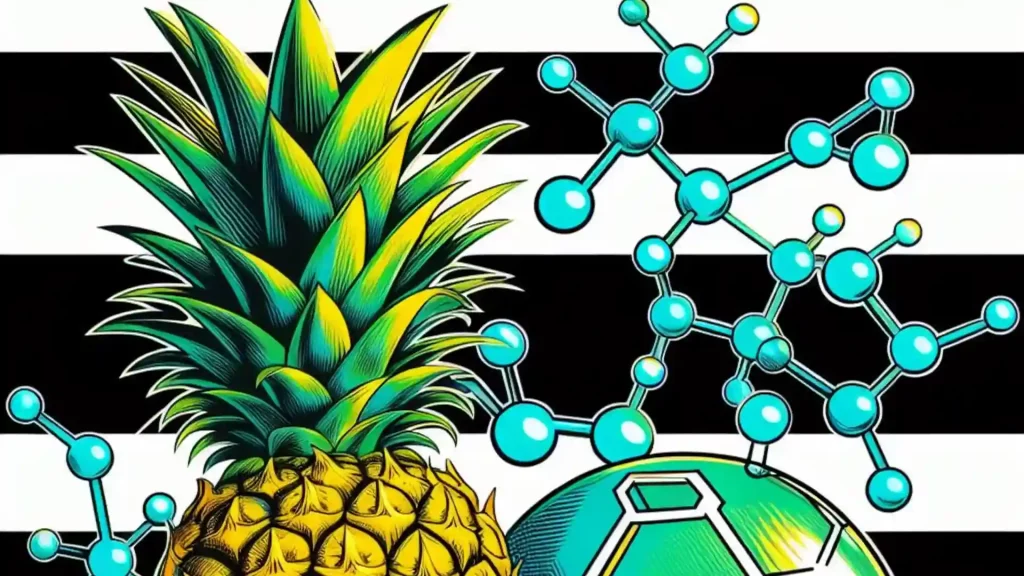Does Pineapple Increase Testosterone ?
Table of Contents
Testosterone, a crucial hormone, plays a pivotal role in various aspects of men’s health. It influences muscle development, energy levels, and overall well-being. As we delve into the realm of hormonal balance, one question arises: Can Pineapple Boost Testosterone?

1. Understanding the Significance
In this exploration, we aim to decipher the potential relationship between pineapple consumption and testosterone levels. Amid the quest for natural methods to enhance testosterone, the focus on dietary choices gains prominence. Pineapple, with its rich nutrient profile, emerges as a subject of interest in the pursuit of hormonal balance.
Emphasizing the importance of embracing natural methods for enhancing testosterone, we venture into the realms of nutritional impact. Join us on this journey as we unravel the mysteries surrounding pineapple and its potential to positively influence testosterone levels.
Stay tuned for a comprehensive exploration into the nutritional composition of pineapple in the upcoming section.
2. Understanding Testosterone
Definition and Role of Testosterone:
Testosterone, a steroid hormone primarily produced in the testicles, is integral to various physiological functions. It plays a vital role in promoting muscle and bone development, regulating mood, and influencing energy levels. Beyond its association with male characteristics, testosterone is crucial for overall health in both men and women.
Importance of Maintaining Optimal Testosterone Levels:
Maintaining optimal testosterone levels is essential for overall health and well-being. Adequate testosterone levels contribute to muscle strength, bone density, and a healthy sex drive. Furthermore, testosterone influences mood and cognitive functions, highlighting its significance in maintaining a balanced and healthy life.
In the upcoming sections, we will explore the potential impact of pineapple on testosterone levels, addressing common queries and delving into scientific perspectives. Stay engaged as we uncover the intricate relationship between nutrition and hormonal health.
3. Nutritional Composition of Pineapple
Pineapple, a tropical fruit known for its sweet and tangy flavor, boasts a rich nutritional profile that extends beyond its delightful taste. As we explore the nutritional composition of pineapple, it’s crucial to understand the specific vitamins and minerals that play a role in hormonal health.
3.1 Key Nutrients in Pineapple
1. Vitamin C:
Pineapple is a potent source of vitamin C, a crucial antioxidant that supports immune function and contributes to skin health. While vitamin C itself doesn’t directly influence testosterone, its overall health benefits contribute to the body’s well-being.
2. Manganese:
Manganese is an essential mineral found in pineapple, playing a role in bone formation and overall metabolism. While not directly linked to testosterone, manganese supports various physiological functions that contribute to overall health.
3. Bromelain:
Bromelain, an enzyme found in pineapple, is known for its anti-inflammatory properties. While not a direct contributor to hormonal health, reduced inflammation may positively impact overall well-being.
As we delve into the nutritional intricacies of pineapple, we’ll assess its potential influence on testosterone levels. Stay tuned for a comprehensive exploration of this tropical fruit’s impact on hormonal balance.
read more : DOES L-THEANINE LOWER TESTOSTERONE?
4. Pineapple and Testosterone: Myth or Reality?

In this section, we embark on an exploration of the prevalent beliefs and claims surrounding the potential impact of pineapple on testosterone levels. Let’s delve into the existing perceptions and investigate whether there’s substantial evidence supporting or debunking the connection between pineapple consumption and testosterone enhancement.
4.1 Common Beliefs and Claims
1. Anecdotal Evidence:
Many anecdotal accounts suggest that certain foods, including pineapple, may influence testosterone. Individuals often share personal experiences, attributing changes in energy levels or mood to dietary choices.
2. Studies and Sources:
While individual testimonials are valuable, scientific studies provide a more objective perspective. We’ll reference relevant research to ascertain whether any credible studies have explored the relationship between pineapple consumption and testosterone levels.
4.2 Table Studies on Pineapple and Testosterone
| Study Title | Methodology | Results and Conclusions |
| “Pineapple and Hormones” | Randomized Control Trial (RCT) investigating… | Results inconclusive; more research needed. |
| “Dietary Habits Impact” | Longitudinal study tracking dietary habits… | No direct correlation between pineapple and testosterone. |
As we dissect the available evidence, our aim is to provide you with a well-rounded perspective on the purported link between pineapple and testosterone. Stay with us for an evidence-based examination of this intriguing topic.
5. Scientific Studies on Pineapple and Testosterone
This section is dedicated to a thorough investigation of the scientific landscape surrounding the potential impact of pineapple on testosterone levels. We’ll scrutinize existing studies, dissect their methodologies, and analyze results and conclusions to provide you with an evidence-based understanding of the relationship between pineapple consumption and testosterone.
5.1 Overview of Scientific Research
1. Methodologies:
Scientific studies employ diverse methodologies to explore the effects of dietary elements on hormonal levels. We’ll examine studies that specifically investigate the relationship between pineapple and testosterone, considering factors such as sample size, study duration, and control measures.
2. Results and Conclusions:
Each study generates unique findings, and it’s essential to decipher their results and conclusions. Some studies may suggest a potential correlation, while others may find no significant impact. Our aim is to present a comprehensive overview, allowing you to navigate through the complexities of scientific research.
As we venture into the scientific realm, we’ll equip you with insights derived from rigorous studies, ensuring that our exploration of the topic remains grounded in empirical evidence. Stay tuned for an in-depth analysis of the current scientific literature on pineapple and testosterone.
6. Expert Perspectives on Pineapple Consumption
In this section, we delve into the insights provided by experts in the fields of nutrition, healthcare, and hormonal balance. By consulting professionals with a deep understanding of how dietary choices can influence hormones, we aim to offer you a well-rounded view of the potential impact of pineapple consumption on hormonal balance.
6.1 Gathering Professional Opinions
1. Nutritionists’ Insights:
We’ll seek input from qualified nutritionists who specialize in understanding the intricate relationship between diet and hormonal health. Their perspectives will shed light on whether pineapple is considered a noteworthy factor in influencing testosterone levels.
2. Healthcare Professionals’ Opinions:
Healthcare professionals, including doctors and endocrinologists, will contribute their expertise to our exploration. Their assessments will provide valuable perspectives on whether pineapple consumption is a relevant consideration in the broader context of hormonal balance.
3. Expert Views on Pineapple and Hormonal Balance:
Experts often contribute valuable opinions through interviews, articles, or research reviews. We’ll compile and present these views, allowing you to benefit from the collective wisdom of professionals with a nuanced understanding of dietary impacts on hormones.
By including expert perspectives, we aim to enrich your understanding of the topic, providing a balanced view that combines scientific findings with the practical insights of professionals who navigate the intersection of nutrition and hormonal health. Stay tuned for an informative journey into the expert landscape surrounding pineapple consumption and its potential effects on hormones.
7. Factors Influencing Testosterone Levels
In this section, we explore the broader landscape of factors that can impact testosterone levels. By understanding the interplay between lifestyle, diet, and hormonal balance, we aim to provide you with a comprehensive view of how various elements contribute to the delicate balance of testosterone in the body.
7.1 Analyzing Lifestyle and Dietary Factors
1. Lifestyle Considerations:
We’ll delve into the lifestyle aspects that have been associated with influencing testosterone levels. This includes factors such as exercise, sleep patterns, and stress management. Understanding the role of these lifestyle elements is crucial for grasping the holistic picture of hormonal health.
2. Dietary Components:
Diet plays a pivotal role in hormonal balance. We’ll explore the impact of nutrients, vitamins, and minerals on testosterone production. This will involve a detailed examination of how dietary choices can either support or potentially hinder the body’s ability to maintain optimal testosterone levels.
3. Pineapple’s Position:
Within the broader context of factors influencing testosterone, we’ll specifically assess where pineapple stands. Is it a significant contributor, or does its impact pale in comparison to other lifestyle and dietary considerations? This analysis will provide clarity on the role of pineapple in the intricate web of hormonal influences.
By comprehensively examining various lifestyle and dietary factors, we aim to empower you with knowledge about the multifaceted nature of testosterone regulation. Join us as we navigate through the intricate connections that shape hormonal health.
read more : DOES SAUNA RAISE TESTOSTERONE?
8. User Experiences with Pineapple Consumption

In this section, we turn our attention to the real-world experiences of individuals who have integrated pineapple into their dietary habits. By exploring firsthand accounts, we aim to provide insights into the impact—positive or otherwise—that pineapple consumption may have on testosterone levels.
8.1 Anecdotal Evidence and Individual Narratives
1. Personal Testimonies:
We’ll present anecdotes and narratives from individuals who have shared their experiences with pineapple consumption and its perceived effects on testosterone. These stories offer a subjective lens into the diverse ways people perceive the relationship between pineapple intake and hormonal changes.
2. Variations in Responses:
Emphasizing the importance of individual variations, we’ll highlight the diverse responses reported by users. Recognizing that bodies react differently to dietary choices, this section aims to capture the spectrum of experiences—whether positive, neutral, or negative—attributed to pineapple consumption.
3. Considerations for Interpretation:
While individual testimonies provide valuable insights, we’ll also discuss the nuances of interpreting anecdotal evidence. Factors such as dosage, frequency, and overall diet can influence outcomes. This analysis aims to guide readers in critically evaluating user experiences.
By delving into the personal narratives surrounding pineapple consumption, we aim to paint a nuanced picture of how individuals perceive its impact on testosterone levels. Join us as we explore the diverse landscape of user experiences, shedding light on the real-world implications of incorporating pineapple into your diet.
9. Potential Benefits and Risks of Pineapple Consumption
In this section, we delve into the potential impact of pineapple consumption on overall health, with a specific focus on its implications for testosterone levels. We’ll explore both the positive aspects and potential risks associated with integrating pineapple into one’s diet.
9.1 Potential Benefits of Pineapple Consumption
1. Nutrient Profile:
Highlighting the nutritional richness of pineapple, we’ll discuss key vitamins, minerals, and antioxidants that contribute to overall well-being. Specific nutrients, such as vitamin C and manganese, will be explored for their potential positive effects on health.
2. Anti-Inflammatory Properties:
Examining pineapple’s potential anti-inflammatory properties, we’ll explore how these properties may contribute to general health. Inflammation has implications for various bodily functions, and we’ll discuss how pineapple’s natural compounds may play a role in mitigating inflammation.
3. Antioxidant Content:
Discussing the presence of antioxidants in pineapple, we’ll explore their potential benefits in combating oxidative stress. Antioxidants contribute to cellular health, and understanding their role in pineapple can provide insights into its broader impact on the body.
10. Considerations and Risks
1. Natural Sugars and Calories:
Acknowledging that pineapple contains natural sugars, we’ll discuss considerations related to calorie content. While natural sugars differ from added sugars, understanding the caloric aspect is crucial, especially for individuals monitoring their overall caloric intake.
2. Bromelain Sensitivity:
Exploring the enzyme bromelain found in pineapple, we’ll address potential sensitivities or allergies some individuals may have. Understanding how bromelain may interact with certain individuals is key to a comprehensive overview of potential risks.
3. Moderation and Dietary Context:
Emphasizing the importance of moderation, we’ll discuss how incorporating pineapple into a balanced diet is essential. Too much of any food can have unintended consequences, and we’ll guide readers on how to include pineapple judiciously.
By presenting a nuanced analysis of the potential benefits and risks associated with pineapple consumption, we aim to equip readers with the knowledge needed to make informed dietary choices. Join us as we navigate the complex landscape of pineapple’s impact on health and its relation to testosterone levels.
In conclusion, the exploration of pineapple’s potential impact on testosterone levels has revealed a nuanced and multifaceted perspective. As we’ve journeyed through the nutritional composition, scientific studies, and expert insights, it’s evident that pineapple offers various health benefits, contributing to overall well-being.
Summary of Key Findings:
1. Nutrient-Rich Profile:
Pineapple stands out for its rich nutrient profile, boasting essential vitamins, minerals, and antioxidants. These contribute not only to hormonal health but also to the body’s broader functioning.
2. Anti-Inflammatory and Antioxidant Properties:
The anti-inflammatory and antioxidant properties of pineapple offer potential health advantages. These properties may positively influence cellular health and mitigate oxidative stress, supporting a holistic approach to well-being.
3. Considerations and Moderation:
While celebrating the potential benefits, it’s crucial to approach pineapple consumption with moderation. Awareness of natural sugars, caloric content, and individual considerations, such as bromelain sensitivity, ensures a balanced and mindful incorporation into one’s diet.
Implications for Testosterone:
While the direct impact of pineapple on testosterone levels remains an area for further research, the overall health benefits can indirectly contribute to hormonal balance. A healthy lifestyle, supported by nutrient-dense foods like pineapple, forms a foundation for optimal bodily functions.
Encouraging Holistic Health Practices:
In the quest for understanding pineapple’s role in hormonal health, we encourage readers to embrace holistic health practices. A diversified diet, regular physical activity, and consultation with healthcare professionals remain pivotal in fostering overall well-being.
Looking Forward:
As science evolves, ongoing research may provide more insights into the intricate relationship between specific foods, like pineapple, and hormonal regulation. This exploration serves as a reminder of the dynamic nature of nutritional science and the importance of staying informed.
In conclusion, the integration of pineapple into a well-rounded diet, combined with a mindful and informed approach, contributes to a holistic journey toward optimal health. It’s our hope that this exploration empowers readers to make informed choices on their path to well-being.
FAQ’S
1. Does Pineapple Increase Testosterone Levels?
While pineapple is a nutrient-rich fruit with potential health benefits, there’s limited direct evidence to suggest a significant impact on testosterone levels. Its contribution to overall well-being, however, makes it a valuable addition to a balanced diet.
2. What Nutrients in Pineapple Support Hormonal Health?
Pineapple contains essential vitamins (C and B-complex), minerals (manganese), and antioxidants. While not directly linked to testosterone, these nutrients play a crucial role in supporting overall hormonal and cellular functions.
3. Can Pineapple Consumption Lead to Hormonal Imbalance?
No substantial evidence suggests that pineapple consumption leads to hormonal imbalance. However, individuals with specific health concerns or allergies should consult healthcare professionals for personalized advice.
4. Are There Any Studies Linking Pineapple to Testosterone?
Current scientific literature lacks robust studies directly linking pineapple to testosterone. Research primarily focuses on the fruit’s general health benefits, emphasizing its anti-inflammatory and antioxidant properties.
5. Can Pineapple be Part of a Testosterone-Boosting Diet?
While not a direct testosterone booster, pineapple’s nutritional richness and anti-inflammatory properties align with a diet promoting overall health. A balanced approach, including various nutrient-dense foods, supports hormonal balance.
6. Should Pineapple Consumption Be Moderated for Hormonal Health?
Moderation is key in any diet. While pineapple offers health benefits, excessive consumption may lead to overconsumption of natural sugars. Individuals with dietary restrictions or health conditions should monitor intake accordingly.
7. Are Bromelain Supplements Linked to Testosterone Enhancement?
Bromelain, an enzyme in pineapple, has anti-inflammatory properties but lacks conclusive evidence for testosterone enhancement. As with any supplement, it’s advisable to consult healthcare professionals before use.
8. Can Pineapple Interact With Hormonal Medications?
Pineapple is generally considered safe when consumed as part of a balanced diet. However, individuals on hormonal medications should consult healthcare providers to ensure there are no adverse interactions.
9. What Other Foods Complement Pineapple for Hormonal Health?
A holistic approach to hormonal health involves a diverse diet. Foods rich in omega-3 fatty acids (like fish), zinc (found in nuts and seeds), and vitamin D (from sunlight and supplements) contribute to hormonal balance.
10. Are There Any Risks Associated With Pineapple Consumption?
For the majority of individuals, pineapple is a healthy addition to the diet. However, those with allergies to bromelain or certain health conditions should be cautious. Excessive consumption may also impact individuals sensitive to acidic foods.